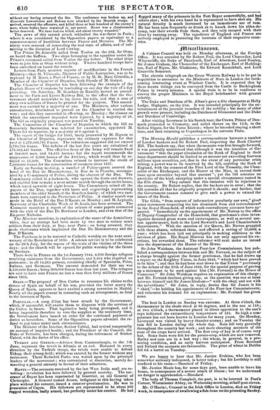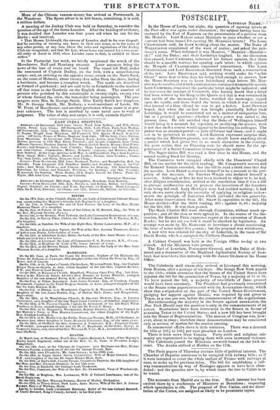liftistellantous.
A Cabinet Council was held on Monday afternoon, at the Foreign Office. It was attended by Sir Robert Peel, the Lord Chancellor, Lord Wharncliffe, the Duke of Buccleuch, Earl of Aberdeen, Lord Stanley, Sir James Graham, the Chancellor of the Exchequer, Earl of Redding- ton, Earl of Ripon, Mr. Gladstone, Sir Edward Knatchbull, and Lord Granville Somerset.
The electric telegraph on the Great Western Railway is to be put in requisition to announce to the Ministers of State in London the forth- coming interesting event at Windsor Castle. It is expected that by these means tidings can be conveyed from the Castle to Buckingham Palace in twenty minutes. A special train is to be in readiness to convey the proper Ministers to the Royal bedchamber with greater celerity.
The Duke and Dutchess of St. Alban's gave a fête champetre at Holly Lodge, Highgate, on the 21st. It was intended principally for the en- tertainment of the juvenile branches of the nobility ; but many of older growth were present, including the Dutchess of Gloucester and the Duke and Dutchess of Cambridge.
After visiting Inverness in his Scotch tour, the Crown Prince of Den- mark proceeded to Cromarty, and sailed thence on the 15th, in the Gefion frigate, for the Faroe Islands ; where he intended staying a short time, and then returning to Copenhagen in the corvette Flora.
The Morning Herald publishes a correspondence between a number of London bankers and Sir Robert Peel, respecting the Bank Charter Bill. The bankers say, that when the measure was first brought forward, it was generally understood that although it was the intention of Go- vernment " that the paper circulation of the Bank of England in their issue-department should be limited to an amount not exceeding fourteen millions upon securities, yet, that in the event of any particular crisis arising, a power was to be reserved by the bill, enabling the Bank of England, with the consent of the First Lord of the Treasury, the Chau-_ eellor of the Exchequer, and the Master of the Mint, to extend their issue upon securities beyond that amount "; yet the bill contains no provision of the kind, excepting under a special circumstance named in the fifth clause. They submit that this omission will be injurious to the country. Sir Robert replies, that the bankers are in error ; that the bill contains all that he originally proposed it should ; and further, that the Government cannot consent to give such a power to extend the issues of the Bank.
The Globe, "from sources of information peculiarly our own," gives some statements respecting the late dismissals from and retrenchments in the Royal Household, of which such contradictory accounts have ap- peared. " Immediately on the appointment of Mr. Norton to the office of Deputy-Comptroller of the Household, that gentleman's close inves- tigation detected great waste and extravagance, as well as several use- less appointments, both in the Lord Steward's and Lord Chamberlain's departments." With the sanction of the Queen, Mr. Norton grappled with these abuses, reformed them, and effected a saving of 10,0001. a year ; which has been laid out principally in making additions to the services of plate. His Royal Mistress has not only approved his ex- ertions, but rewarded them. The reformer will next make an inroad into the department of the Master of the Horse.
Sir John Walsham, the Assistant Poor-law Commissioner, has pub- lished a correspondence between him and Mr. Ferrand, on the subject of a charge brought against the former gentleman, that he had drawn up a report on the Keighley Union, in June 1842, " which had been proved to be false "; and that he had been sent down to that Union " previously to the debate of the 27th of June 1842, for the special purpose of getting up a statement to be used against him (Mr. Ferrand) in the House of Commons." Sir John Walsham requires an explanation of this charge ; and Mr. Ferrand declines giving any, as the question was one at issue between himself and Sir James Graham—" with the chief, and not with the subordinate." Sir John, in reply, denies that Sir James is his " chief,"—he holding his appointment of the Poor-law Commissioners; and reiterates his demand for an explanation : Mr. Ferrand has given none.
The heat in London on Sunday was extreme. At three o'clock, the thermometer in the shade stood at 86 degrees, and in the sun at 110 ; at two o'clock, a thermometer placed in direct opposition to the sun's rays indicated the extraordinary temperature of 121. So high a tem- perature has not been known in London for many years. On Monday, Liverpool was visited by heavy thunder-storms ; and on Tuesday the rain fell in London during the whole day. Rain fell very generally throughout the country last week ; and more cheering accounts of the state of the crops have arrived. The first crop of hay is of course very bad. Some fears were felt for the potato-crop, which are now removed. Barley and oats are in a had way ; the wheat, in general, in a pro- mising condition, and an early harvest anticipated. From Scotland and Ireland the accounts are favourable. The price of wheat in Dublin fell 6d. a barrel on Tuesday.
We are happy to bear that Mr. Justice Erskine, who has been somewhat seriously indisposed, is better today ; but his Lordship is still confined to his room.—Standard of Friday.
Mr. Justice Manle has, for some days past, been unable to leave his house, in consequence of a severe attack of illness ; but we understand no danger is apprehended.—Standard.
The body of Thomas Campbell, the poet, is to be interred in Poet's Corner, Westminster Abbey, on Wednesday morning, at half-past eleven.
Mr. O'Hanlan, Counsel to the Irish Office in London, died on Friday week, in consequence of swallowing a fish-bone on the preceding Sunday.
More of the Chinese ransom-money has arrived at Portsmouth, in the Wanderer. The Sycee silver is in 250 boxes, containing, it is said, a million dollars.
A meeting of the Jockey Club was held on Saturday, to consider the question of the age of the horse Leander. After the hearing of evidence, it was decided that Leander was four years old when he ran for the Derby ; and resolved, " That Messrs. Licbtwald, the owners of Leander, shall be for ever disquali- fied for entering or running any horse in their own name, or in the name of any other person, at any race where the rules and regulations of the Jockey Club are recognized ; and that Mr. Ley, whose horse ran second for a two-year- old stake at Ascot in 1843, when Leander came in first, is entitled to those stakes."
In the Postscript last week, we briefly mentioned the wreck of the Manchester, Hull and Hamburg steamer. Later accounts bring the news of the loss of every soul on board. The vessel left Hull, under the command of Captain Dudley, on the 10th, with a miscellaneous cargo; and, on arriving on the opposite coast, struck on the Marie Sand, on the coast of Holstein, about twenty-five miles from the shore, during a hurricane, and became a complete wreck. The sands are described as formed of quicksand ; and are said to be as formidable to the mariner off that coast as the Goodwin on the English shore. The number of persons who perished by this catastrophe is twenty-eight, twenty-two of whom formed the crew, the remainder being passengers. The pas- sengers were Mrs. St. George Smith, Miss Emily Smith her daughter, Mr. St. George Smith, Mr. Rothery, a wool-merchant of Leeds, Mr. W. Frost, of Manchester, and another gentleman whose name is at pre- sent unknown. The loss is ascribed by some naval men to want of judgment. The value of ship and cargo, it is said, exceeds 25,0001.



























 Previous page
Previous page